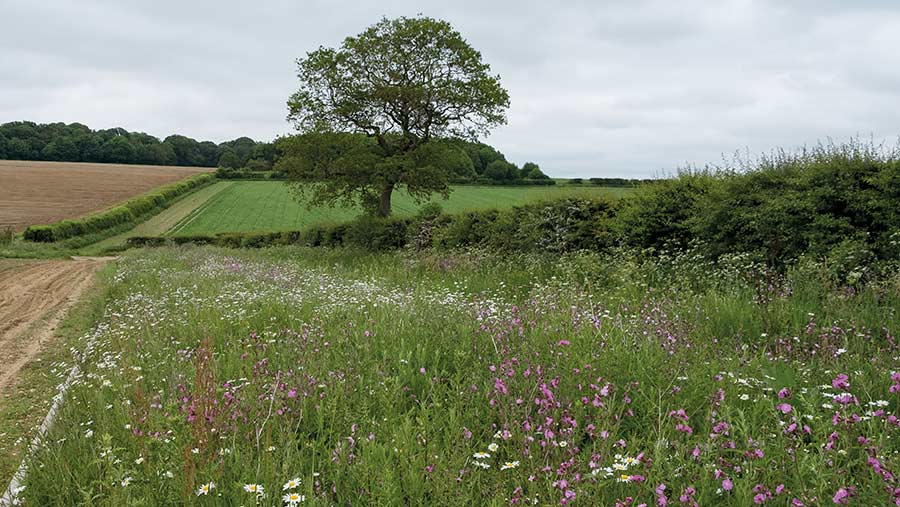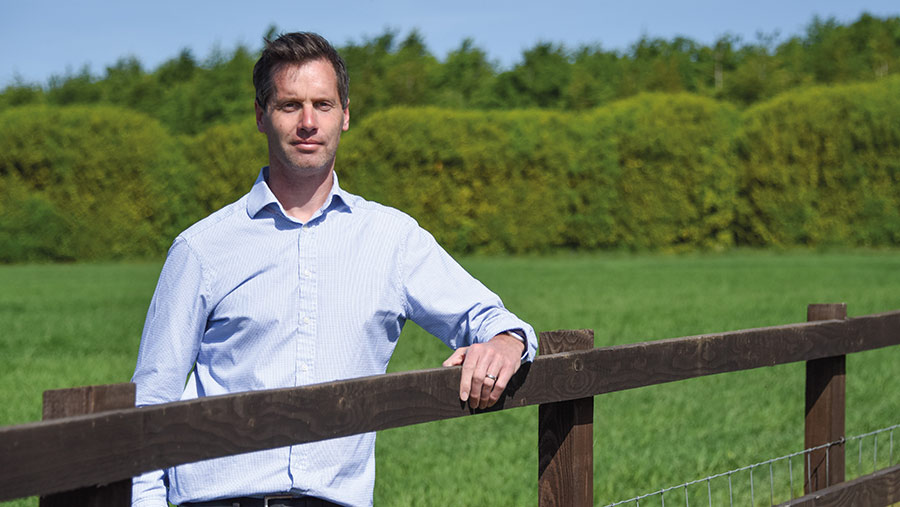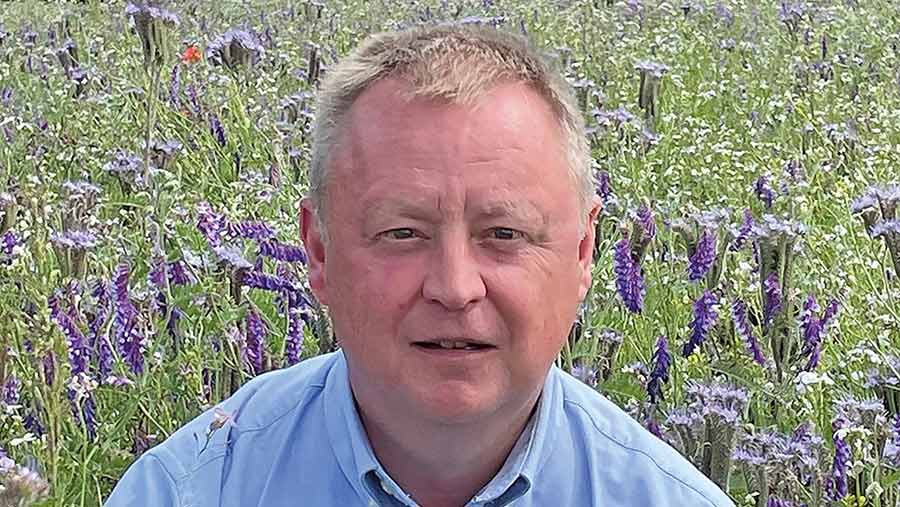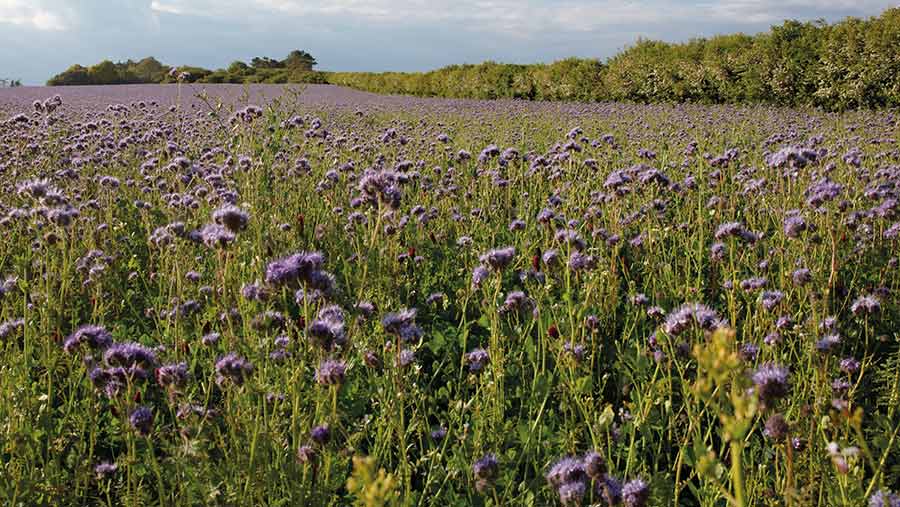Berks estate focuses on soils, insects and companions for SFI
 © Blackthorn Arable
© Blackthorn Arable Nick Down is focusing on the three key elements of soil health, cutting insecticide use and using companion cropping as he looks to fit new environmental scheme payments into an existing Countryside Stewardship (CS) agreement on a large Berkshire farming estate.
The Sustainable Farming Incentive (SFI) looks to pay growers for following good environmental practices, as support for farming policy moves away from direct Basic Payment Scheme (BPS) subsidies in a “public money for public goods” policy shift.
See also: Sustainable Farming Incentive: Two growers weigh up the pros and cons
Velcourt farm manager Mr Down is looking at these three standard elements within the SFI to see if they can fit in with an existing Mid Tier CS scheme across the 2,145ha Yattendon Estate, stretching along the M4 corridor, and avoid any double payments from the two environmental schemes.

Nick Down © Velcourt
“We are very interested in the soils standard and also the no insecticide and companion cropping standards, and we would like to see a bit of flexibility so we could run them alongside our existing CS scheme,” he tells Farmers Weekly.
New SFI standards
The SFI was launched in June 2022 with three standards covering arable soils, livestock soils and one covering moorland, and a further six new or amended standards were unveiled in January 2023 covering areas such as integrated pest management and crop nutrition.
SFI is the first tier of new Environmental Land Management (ELM) schemes to replace direct subsidies while keeping annual support for English farming at £2.4bn until the next general election, to be held by December 2024 at the latest.
The ELM programme consists of three separate, but related, schemes, with the second and third tiers being an enhanced CS scheme and then Landscape Recovery for bespoke longer-term and larger-scale projects.
The area-based BPS was set at £233.30/ha in 2020, was first cut in 2021 and then tapers away with the last annual payments made in 2027.
It will be gone completely by 2028, putting the onus on farmers to claim for these new schemes.

Ian Gould
Ian Gould, director and co-founder of environmental consultants Oakbank Game and Conservation, is becoming more optimistic about the greater flexibility of the new SFI standards as they are being developed and says they can offer good rewards for growers.
Velcourt took a 50% financial stake in Oakbank in April 2022.
“We are very encouraged by the direction of travel. It’s incumbent on farmers and advisers to use this flexibility to deliver the intended benefits of the new schemes and not simply exploit them,” he says.
Stacking
Mr Gould points out that some of his farmer clients are planning to stack the new standards together to bring in more headline payments than under the original BPS, although there are significant costs involved, such as drilling cover crops and establishing flower-rich margins.
A typical Mid Tier CS scheme agreed across a certain area of a farm might pay the equivalent of £90-£100/ha (before costs) when calculated across the whole farm, and SFI payments should look to add to these returns rather than act as substitutes.
Mr Down manages 2,000ha of arable cropping at Yattendon, some seven miles north-east of Newbury, and is interested in looking at the highest level of arable soils payment outside the SFI pilot scheme.
That is the intermediate level of £40/ha, and the farm is doing most of the requirements already.
There is also a less onerous introductory soils standard at £22/ha, while those 850 farmers in the now-closed three-year pilot scheme can claimed an advanced payment level of £60/ha.
Farm facts
Yattendon Estate
- Farming 2,146ha in-house, with 2,000ha arable and the rest permanent pasture
- Cropping includes milling winter wheat, feed winter barley, malting spring barley, milling spring oats, winter and spring beans, peas and oilseed rape
- The estate is halfway through a five-year Mid Tier Countryside Stewardship scheme covering 300ha, while a further 130ha is in the Sustainable Farming Incentive pilot scheme
- Soils are largely Marlston clay loams with variable flint content, Andover series chalk and Maxstead sandy loams.
The main requirement for the intermediate level is to have 50% of green cover over the winter in terms of crops such as winter cereals, oilseed rape and winter beans, and on top of that 20% must be in multispecies (at least two) cover crops.
There are also requirements for soil assessments, testing organic matter, and adding organic matter – which can be achieved by chopping straw.
Estate cropping
The Berkshire estate grows winter milling wheat, winter feed barley, spring malting barley, spring milling oats and also winter and spring beans, as well as peas.
Oilseed rape is included in an extended rotation to see the crop grown only once every seven to eight years.
Mr Down can currently meet the 50% requirement for winter cropping, but although he has 200ha of cover crops he would need 330ha to meet the soils standard target (taking the estate’s area minus the area taken out of arable production by the 300ha CS scheme).
He could easily add extras cover crops, but is already being paid £129/ha under the CS SW6 winter cover crops option, so could not be paid twice for doing the same practice.
He is also looking at the “no use of insecticides option” under one the new six standards launched earlier this year – integrated pest management (IPM).
This is a three-year option paying £45/ha a year across the whole estate.
Mr Down points out that the estate has very low insecticides use, with these pesticides only being using on winter barley to control the aphids that can spread barley yellow dwarf virus (BYDV).
Winter barley covers just 15% of the arable area.
“We’ve been reducing insecticide use over the past few years and as BYDV-tolerant barley varieties are now performing at a similar level to conventional varieties, this will allow us to reduce this further.
“We would still like some flexibility in an extreme situation where there could be significant damage in peas, for example.
“We don’t expect to be paid if we don’t deliver the outcome, but don’t want to be penalised,” he says.
Mr Gould agrees there should be some flexibility in the case of an insecticide being needed to save a crop from serious damage.
However, some growers, who have not used insecticides for decades, will be very likely to be attracted by this option.
Companion crops

Phacelia © Blackthorn Arable
The third option, which again comes under the IPM standard, is the use of companion crops, which pays £55/ha a year in a three-year deal.
Mr Down has grown oilseed rape successfully with a companion crop based around buckwheat to deter cabbage stem flea beetles and has trialled growing white clover with cereals.
He has also used a catch crop of buckwheat, spring vetch and phacelia between crops of winter barley and winter beans to give ground cover through the autumn, and then the beans are drilled into the growing catch crop which then dies back with the onset of hard frosts.
“The use of companion crops has a place on the farm and the payment will help to cover the cost of the seed,” says Mr Down.
Mr Gould adds that the technique has to bring benefits and no yield reduction.
“You would not need to lose much yield to undo the immediate financial benefits, while the long-term benefits of companion cropping are much harder to quantify,” he says.
Three tiers of the Environmental Land Management scheme
- Sustainable Farming Incentive
- Enhanced Countryside Stewardship (formerly Local Nature Recovery)
- Landscape Recovery – aimed at large individual environmental projects
SFI initial standards (June 2022)
- Arable and horticultural soils standard
- Improved grassland soils standard
- Moorland standard
SFI further standards (January 2023)
- Hedgerows
- Integrated pest management
- Nutrient management
- Arable and horticultural land
- Improved grassland
- Low-input grassland
